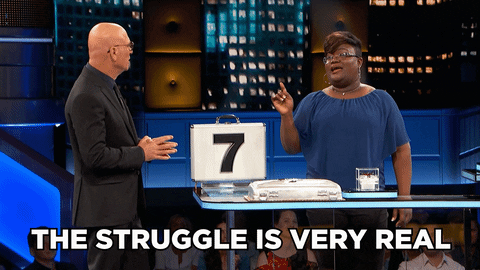
The struggle is real.
Or is it?
We glorify morning schedules that involve waking up at 5 a.m. to exercise, meditate, and work on our side business, all before going to our full-time job. Or we #humblebrag about clocking 60-hour work weeks and don’t remember when we last indulged in some necessary self-care.
We have an obsession with the hustle. We define success by how much we achieve in our complicated, jam-packed lives—at the expense of productivity, relationships, and personal wellbeing.
But is this grind truly justified or is it all in our heads?
The hustle is a factor of our environment and work culture, but it’s also a result of the complexity bias, a subconscious tendency for us to overcomplicate things that are simple. For example, we work overtime to complete a project instead of delegating tasks to coworkers. Or, we use jargony, complicated vocabulary to communicate a basic idea.
The good news? Once you recognize how the complexity bias affects your life, you can understand how to overcome it.
Why Do You Have To Go And Make Things So Complicated?
When we’re faced with two options, the complexity bias pushes us to subconsciously ignore the easier solution because we have assumed that the task should require a certain level of knowledge or effort. This happens all the time in our personal and professional lives. Have you ever spent way too long trying to decipher the instruction manual that comes with IKEA furniture when you could just watch a five-minute video on YouTube?
Or, have you been tasked with creating a PowerPoint presentation and ended up with animations, colors, and design galore when you really only needed to put a few words on some slides?
These are all examples of the complexity bias seeping into your decision making. You convince yourself that the more complex, advanced solution is the right approach when, most times, the simpler alternative will result in the same outcome.

Research has shown that we have a tendency to over-complicate. In one study, participants were asked to establish an arithmetic rule or pattern. They were given a set of three numbers (like 4, 8, 12) and had to guess what the rule was by identifying other numbers that followed the pattern.
The actual rule was very basic: list any three ascending numbers. They could have said anything from “2, 3, 4” to “50, 100, 1,000.” This should have been easy for the participants to guess, but most of them didn’t. Rather than going with the most basic one, they came up with complex, advanced mathematical rules for the sequences.
It’s important to note that complexity in and of itself isn’t a bad thing. Complexity is everywhere and it only becomes a serious issue when it isn’t justified. Donald A. Norman, the author of Living with Complexity, explains the difference:
“Complexity is part of the world, but it shouldn’t be puzzling: we can accept it if we believe this is the way things must be. Just as the owner of a cluttered desk sees order in its structure, we will see order and reason in complexity once we come to understand the underlying principles. But when that complexity is random and arbitrary, then we have reason to be annoyed.”
It’s okay to embrace difficult, complex projects at work that have a purpose. But, when we inject complexity without a reason, our work-life balance, productivity, and overall culture will be negatively impacted.
Every Day I’m Hustlin’
The complexity bias is a worldwide phenomenon, but it seems to have had a particularly meaningful impact on American culture.
Folks in the United States work more hours per year than their English-speaking counterparts in Britain, Canada, and Australia. On top of that, Americans are not taking enough time off to balance all our hours in the office.
A 2018 study found that 47% of Americans didn’t take all of their vacation and 21% left more than five vacation days on the table. Why? The study found that Americans don’t take vacation because it actually causes more stress. Twenty-seven percent of study participants felt like that had “too many projects or deadlines” and 13% were afraid of “the amount of work they’d return to.”

A simple solution may be to focus on being less busy at work, but a Harvard Business Review study found that busyness has actually become a status symbol—one that we do not want to give up. In the study, participants perceived someone who “works long hours” with a very full calendar as having a higher social status than someone who “does not work and has a leisurely lifestyle.”
This mindset is amplified in the United States compared to other parts of the world: busyness at work is associated with higher status among Americans, but the effect was reversed for Italians, who instead linked leisure with status.
All this to say: the complexity bias is baked into American culture, and its effects are showing up on calendars, traveling habits, and stress levels. It’s not impossible to escape, but requires commitment, diligence, and a support system.
The Fallbacks Of The Hustle
Arianna Huffington, the founder of The Huffington Post, has emerged as a powerful spokeswoman against the hustle culture.
In 2007, she found herself lying on the floor in a pool of blood. She asked her doctors to run several tests, but nothing was clinically wrong. She was just burnt out, which caused her to pass out, hit the corner of her desk, and cut her eye open. Since her fall, she’s been more mindful of her work habits, even stepping down as editor-in-chief of The Huffington Post to focus on her new initiative to reduce stress and burnout, Thrive Global.
“It’s really all about prioritization – about figuring out what absolutely has to be done, and then giving yourself time, instead of trying to do it all. It’s important to remember that trying to do everything, mostly, means doing nothing very well,” said Huffington in an article on the Collective Hub.
Huffington is right on all counts: studies have shown that productivity dramatically decreases with longer hours and creativity completely disappears once employees work more than 55 hours in a week.

And, just like Huffington experienced, the constant hustle can have real effects on your health.
“By working too hard, you are over producing adrenaline and cortisol and when these are over produced, your immune system is more susceptible to illness and inflammation,” said Stewart Rogers, an analyst at VentureBeat. “Working hard is actually making you ill.”
How To Overcome The Hustle Culture
Our tendency to hustle comes out when we feel pressured, stressed, or insecure. If all your coworkers are working twelve-hour days, it’s tempting to feel like you need to do the same. However, hustling isn’t a permanent state, so these dangerous lifestyle (and side effects) are reversible.
A few simple shifts to your mindset can help you recognize what’s important and what’s actually a result of the complexity bias. Here are three ways to overcome the hustle culture and find balance in your life:
1.) Prioritize A New Perspective
It can be difficult to identify your own subconscious biases, so enlist the help of others to help you learn when you’re over-complicating things.
For example, if you feel especially overwhelmed at work, ask your colleagues how they would approach the project you’re working on. Remember, the complexity bias shields you from seeing simple solutions, so asking others for their opinion can train you to rewire your brain. You can also ask yourself questions to make sure you’re not adding unnecessary complexity. For example, ask yourself: “If I were a new employee, where would I start?” Or, “If I were delegating this task to someone else, what would I tell them to do?”
These questions allow you to get out of your head and see the bigger picture. And, when you have this high-level view of the world, you’re actually more likely to interpret issues as being simple. The New England Complex Systems Institute released a study on “the complexity profile,” a mathematical tool that is designed to capture the relationships between the behavior of parts of a system and the behavior of the entire system. When you apply the complexity profile to humans, you actually see that as the scale gets larger, the issues become less complex.

Image source: New England Complex Systems Institute
For example, at a very small scale (the atomic level), behavior is the most complex. However, when you zoom out and view behavior at the largest scale (societal), behavior actually becomes the least complex.
This is a helpful reminder that perspective is paramount. It’s easy to get stuck in our narrow view, complicating the specific project we’re working on. But, when we take a step back and look at our project in the context of our team or our business, we’re more likely to go down the simple, easy path.
2.) Define Your Personal Success
The complexity bias doesn’t always stem from our own individual perceptions; it can also come from societal pressures that urge us to “work hard, play hard.” There’s a larger complexity bias in the corporate world that encourages us to act a certain way so we are perceived as a hard worker.
Creating this perception is important to us—a study found that Millennials in particular expect more of themselves and of others, and are more and more self-conscious of their perceived inadequacies.
Making tasks more complicated than they need to be helps us present ourselves as top performers and make us feel accomplished. But, pretty soon, you’re associating success with how much time you spend on something or how difficult you make a task.
Take a step back and think about what success really looks like to you, outside of ego and corporate pressure. Consider what kind of results and outcomes you can measure rather than focusing on time spent. The complexity bias will be weaker once you shift your energy to achieving your goal, rather than reacting to external pressures.
3.) Treat Your Time Like Gold
We hustle when we feel like we have too much to do and too little time. But, instead of checking things off our list, we actually end up experiencing “hurry worry” (or time urgency). The combination of deadlines and scarcity of time causes us to enter a chronic state of worry. We speed through tasks just to be able to mark them as complete. When it gets really bad, this behavior can impact our ability to think clearly and make appropriate decisions.
Reality check: There are healthier ways to manage your work. Instead of feeling stressed and rushed to do as much as possible, try some proven time management techniques like getting to inbox zero each night or keeping a complete, up-to-date calendar. Both of these tactics help free up your mental energy to focus on the task at hand.
You can also create more time by thinking strategically. Say goodbye to the spreadsheet and to-do list, and ask yourself what you want to accomplish and why it’s important. Focus on outcomes versus tactics (so “increase revenue by X%” versus “release product features 1, 2, and 3”). The key is to think at the goal level, instead of the task level. This approach can then help you prioritize which projects should happen first and where you should focus your precious time.
Work Smarter, Not Harder
If you ever wonder whether the hustle culture is really that pervasive, think about the most popular answer to the question, “How are you?” Rather than sharing highlights from the weekend or commenting on the weather, the answer has become some iteration of, “Things have been crazy lately, I’m so busy!”
We shouldn’t be promoting how busy we are like we’ve won some sort of award. The greater accomplishment should be increasing efficiency and productivity so we have more time to spend with friends and family, pursuing our hobbies, or just plain relaxing.
To get out of our hustle routine, we need to simplify our routines, projects, and personal lives. We need to clear out the clutter: all those extra tasks and complications we pile onto ourselves that distract us from what is most important.
In the words of Marie Kondo, Japanese organizing consultant and author of the best-selling guide, The Life-Changing Magic of Tidying Up:
“Remember that you are not choosing what to discard, but rather what to keep.”
Focus your energy on what you want to prioritize in your life. Everything else will naturally fall to the sidelines (and you’ll just let them go).










































